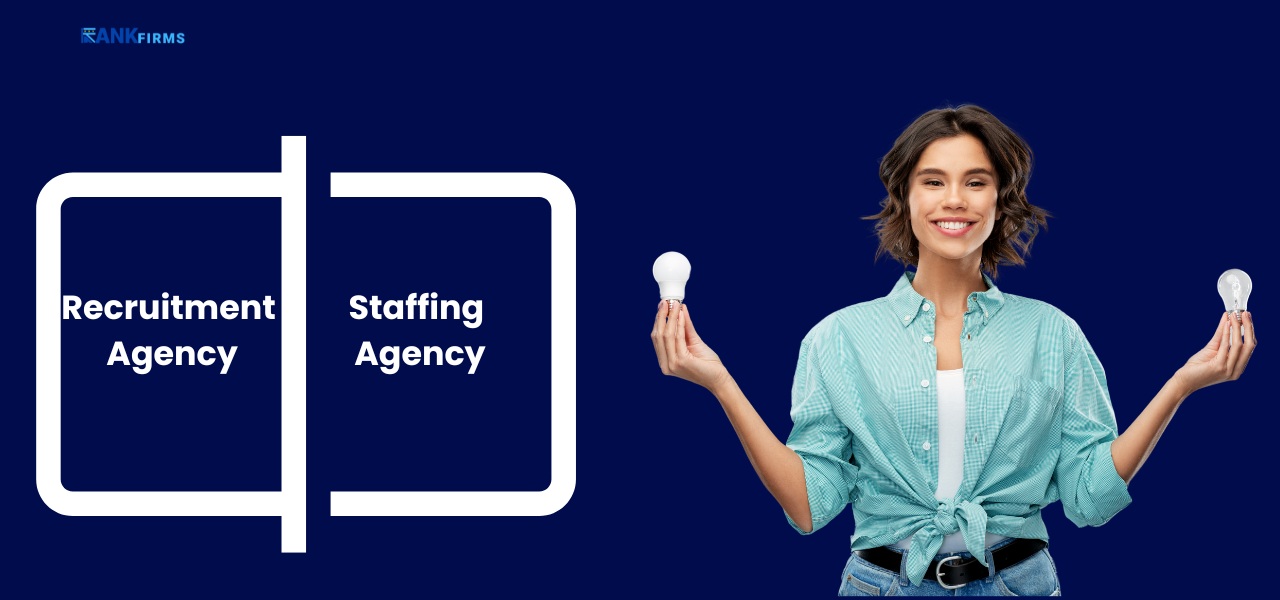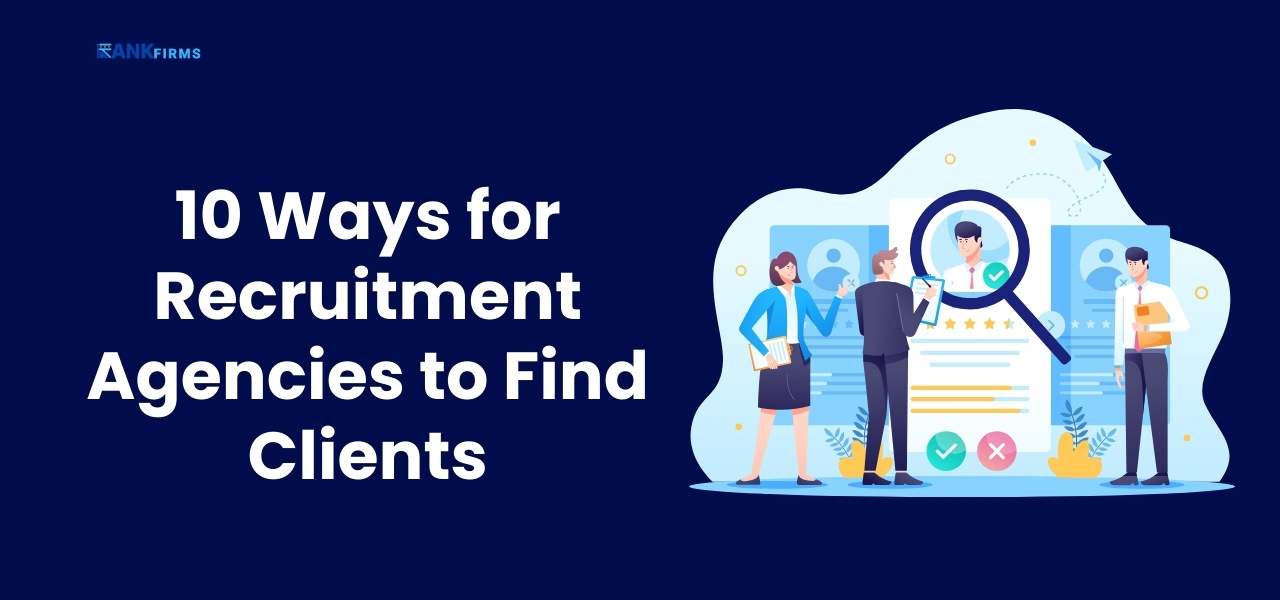With the inception of artificial intelligence, there has been a major shift in multiple sectors including the recruitment industry. The way people have adopted generative AI and used it, the candidate-driven market has taken a turn into an employer-driven market. Be it recruiting, layoffs or any other related task, AI is creating a new direction for recruiting agencies.
Certainly, with AI you can make quick and good decisions. Irrespective of AI, other factors can help you with potential clients. Before we jump to these factors, let’s first learn some statistics.
Since the recruitment industry is one of the competitive sectors, the biggest challenge for them was finding the right talent pool in 2023. It was also observed that 90% of hiring managers need help to source skilled candidates. Moreover, 52% of recruiters face the same challenge when hiring top choices before competitors.
If you calculate the average cost per hire, it reaches approx—$ 4700. Hiring a new resource takes 3-4 times more cost compared to the salary of the empty position.
Did you know that candidate experience matters too for a recruitment agency to shape their reputation? It was observed that 60% of the job seekers were not interested in completing the application process due to the lengthy and complex process.
Additionally, 78% of the recruiters also feel that they have communicated effectively with candidates when setting expectations. The companies that have invested in candidate experience saw 72% enhanced quality of new hires.
American recruitment agencies placed over 14.5 million temporary and contract employees in a single year. The total revenue of the recruitment industry in 2023 reached approximately 593 billion U.S. dollars. 20% of temporary and contract workers choose this arrangement due to schedule flexibility. US recruitment agencies experienced a moderate 5% year-over-year revenue decline in February, consistent with the 5% decrease in December 2023.
The numbers are countless to know about the competitive market of the recruitment industry and because we cannot cover all of it we will move further with the factors.
Recruitment Agency And Their Importance

Recruitment agencies play a crucial role in the hiring process by acting as intermediaries between job seekers and employers. They offer a range of services to streamline the recruitment process and ensure that the best candidates are matched with suitable roles.
1. Key Roles of Recruitment Agencies:
Candidate Sourcing:
Recruiting agencies in USA utilize their extensive networks and databases to identify and attract qualified candidates for job openings. They often have access to a wider pool of candidates than employers can reach on their own.
Screening and Assessment:
Agencies conduct initial assessments, including resume reviews, phone interviews, and skills tests, to shortlist candidates based on their qualifications and experience.
Matching Candidates with Jobs:
Recruitment agencies match candidates with suitable job openings based on their skills, experience, and career goals. They have a deep understanding of the job market and can identify the best candidates for specific roles.
Negotiation:
Agencies often assist in negotiating salary, benefits, and other employment terms between candidates and employers.
Onboarding:
Some agencies may provide onboarding support to help new hires transition smoothly into their roles.
2. Why Recruitment Agencies Are Important
Save Time and Resources:
Using a recruitment agency can save employers time and resources by handling the hiring process.
Access to a Wider Talent Pool:
Agencies have access to a larger network of candidates, increasing the chances of finding the right fit.
Specialised Expertise:
Recruitment agencies often have specialised knowledge in specific industries or job roles.
Reduced Risk:
Agencies can help mitigate the risk of hiring mistakes by conducting thorough candidate assessments.
Scalability:
Agencies can quickly scale up or down their services to meet changing hiring needs.
Many of you think recruitment agencies are the same as staff augmentation companies. But you are mistaken, they vary. However they both find and provide the right candidate for your needs, yet there are differences. Let’s know what:
Differences: Recruitment Agency vs Staffing Agency

While the terms “recruitment agency” and “staffing agency” are often used interchangeably, there are subtle distinctions between them.
1. Focus: Finding Permanent Employees
Recruitment agencies specialise in finding the perfect long-term match for both employers and candidates. Here’s a deeper look at how they achieve this:
Candidate Sourcing:
Recruiters go beyond simply reviewing resumes. They actively source candidates through professional networks, job boards, and industry events.
Detailed Screening:
Unlike staffing agencies, recruitment agencies conduct thorough assessments of candidates. This may involve multiple interviews, skills tests, and in-depth reference checks.
Cultural Fit Assessment:
Recruitment agencies often assess whether a candidate aligns with the organisation’s culture. This ensures a smooth transition and a long-term, successful hire.
Negotiation and Offer:
Recruitment agencies can help negotiate salary, benefits, and other employment terms on behalf of the candidate, ensuring a competitive offer.
Onboarding Support:
While not always offered, some recruitment agencies provide onboarding support to help new hires integrate into the company seamlessly.
2. Benefits for Employers:
Reduced Hiring Time:
Recruiters can leverage their networks and expertise to identify qualified candidates quickly.
Improved Quality of Hire:
Thorough assessments minimise the risk of bad hires.
Reduced Costs:
Long-term employee retention translates to lower costs compared to frequent temporary staffing.
Long-Term Partnership:
Recruiters build relationships with the company, understanding their culture and future needs.
3. Benefits for Candidates:
Access to Hidden Job Market:
Recruiters have access to a wider talent pool and may connect you with unadvertised opportunities.
Career Guidance:
Recruiters offer coaching and interview preparation to optimise your candidacy.
Negotiation Assistance:
Experienced recruiters can help you negotiate a competitive salary and benefits package.
Also Read: How to Find Clients for B2B Lead Generation Agency?
4. Staffing Agencies: A Different Approach
Focus: Filling Temporary Needs
Staffing agencies specialise in providing temporary or contract workers to meet companies’ short-term staffing needs. Here’s what sets them apart:
Fast Placement: .
Staffing agencies focus on filling vacancies quickly, often with a focus on core skills for specific tasks.
Streamlined Process:
The assessment process tends to be less rigorous compared to recruitment agencies.
Large Talent Pool:
Staffing agencies maintain a database of pre-qualified candidates to ensure a quick turnaround.
Flexibility for Employers:
Companies can leverage staffing agencies to handle seasonal fluctuations or project-based hiring needs.
Flexibility for Workers:
Staffing agencies offer temporary and contract opportunities to those seeking short-term work or career exploration.
5. Benefits for Employers:
Immediate Staffing:
Staffing agencies fill vacant positions quickly, ensuring continuous workflow.
Reduced Cost:
Companies only pay for the time and expertise needed, making it a cost-effective solution for short-term needs.
Lower Risk:
Staffing agencies handle payroll and worker’s compensation, reducing administrative burdens for employers.
6. Benefits for Workers:
Fast Employment:
Staffing agencies offer quick job opportunities, ideal for those seeking immediate income.
Variety of Roles:
Workers can explore different industries and roles before committing to a permanent position.
Flexibility:
Temporary work offers flexibility in schedules, suitable for students or those seeking work-life balance.
Understanding the distinctions between recruitment agencies and staffing agencies empowers both employers and job seekers to choose the right resource for their needs. Further, let’s move to the ways recruitment agencies can extend their reputation and gain more new clients.
10 Ways for Recruitment Agencies to Find Clients

1. Leverage B2B Marketplaces
Identify target markets: Research specific industries or regions where your recruitment services can be valuable. For example, if you specialise in IT recruitment, focus on IT services companies in your target area.
Utilize B2B marketplaces:
Platforms like RankFirms provide directories of companies and their contact information. These marketplaces can help you identify potential clients within your target markets.
Tailor your approach:
Research potential client’s needs and customize your outreach accordingly. Personalize your messages to demonstrate your understanding of their specific requirements.
2. Reach Out Directly
Cold calling:
Develop a targeted list of potential clients and reach out to them directly. Use a script to guide your conversation and ensure you’re providing valuable information.
Email outreach:
Send personalized emails introducing your agency and highlighting your services. Tailor your email content to the specific needs of each recipient.
Social media:
Connect with potential clients on platforms like LinkedIn and initiate conversations. Join relevant industry groups and participate in discussions.
3. Ask for Referrals
Encourage satisfied clients:
Ask satisfied clients to refer your agency to their network. Offer incentives or rewards to encourage referrals.
Track referrals:
Implement a system to track referrals and measure their effectiveness.
Thank clients for referrals:
Express gratitude to clients who refer new business and maintain positive relationships.
4. Run Email Campaigns
Build an email list:
Collect email addresses from potential clients through website forms, social media, or industry events.
Segment your list:
Divide your email list into segments based on industry, company size, or other relevant criteria.
Create targeted campaigns:
Develop personalized email campaigns that address the specific needs and interests of each segment.
Use email marketing software:
Utilize email marketing tools to automate campaigns, track open rates, and measure click-through rates.
5. Participate in Networking Events
Identify relevant events:
Attend industry conferences, trade shows, and networking events that are relevant to your target market.
Prepare for networking:
Develop a strong elevator pitch and practice your networking skills.
Follow up:
After meeting potential clients, follow up with a personalized email or phone call to maintain the connection.
6. Use Content Marketing
Create valuable content:
Develop blog posts, articles, or webinars that showcase your expertise and provide value to your target audience.
Optimize for search engines:
Optimize your content for relevant keywords to improve visibility in search results.
Promote your content:
Share your content on social media, through email marketing, and on industry forums.
7. Stay Updated with Recruitment Tech
Leverage applicant tracking systems (ATS):
Utilize ATS to streamline your recruitment processes and manage candidate data.
Utilize CRM software:
Implement a CRM system to track leads, manage client relationships, and analyze performance.
Stay updated on industry trends:
Keep up with the latest recruitment technologies and best practices to maintain a competitive edge.
8. Leverage Social Media
Create a strong online presence:
Establish and maintain active profiles on professional networking platforms like LinkedIn.
Share valuable content:
Regularly share industry insights, articles, and updates related to your services.
Engage with your audience:
Respond to comments, messages, and questions promptly to build relationships.
9. Offer Specialized Services
Identify niche areas:
Focus on specific industries or job roles where you have expertise.
Highlight your specialisation:
Communicate your unique selling points and how they can benefit clients.
10. Partner with Complementary Businesses
Collaborate with other businesses:
Partner with complementary businesses, such as HR consulting firms or executive search agencies.
Cross-promote services:
Offer joint services or promotions to attract a wider audience.
Share leads:
Refer clients to your partners and vice versa.
Also Read: Demand Generation vs Lead Generation: What Should You Know?
By implementing these strategies, recruitment agencies can effectively identify and attract new clients, expand their market reach, and drive growth.
Conclusion
Successfully attracting new clients requires a multifaceted approach that combines effective marketing strategies, strong relationships, and a deep understanding of your target market. By implementing the strategies outlined in this guide, recruitment agencies can position themselves as trusted partners in the industry and achieve sustainable growth.
1. Leverage digital marketing:
Utilize SEO, content marketing, social media, and PPC advertising to reach potential clients.
2. Build strong relationships:
Network with industry professionals, attend events, and prioritize client satisfaction.
3. Offer specialized services:
Focus on niche areas or industries to differentiate your agency.
4. Utilize technology:
Leverage tools like ATS and CRM software to streamline your processes.
5. Continuously improve:
Stay updated on industry trends and adapt your strategies to changing market conditions.
By consistently implementing these strategies, recruitment agencies can attract new clients, expand their market reach, and establish themselves as leaders in the industry.







